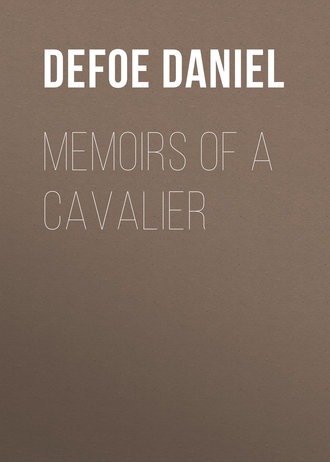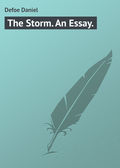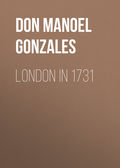
Даниэль Дефо
Memoirs of a Cavalier
We came, as I said, into the town by several ways, and so we went out; but about three miles from the town we met again exactly where we had agreed. I being about a quarter of a mile from the rest, I meets three country fellows on horseback; one had a long pole on his shoulder, another a fork, the third no weapon at all, that I saw. I gave them the road very orderly, being habited like one of their brethren; but one of them stopping short at me, and looking earnestly calls out, "Hark thee, friend," says he, in a broad north-country tone, "whar hast thou thilk horse?" I must confess I was in the utmost confusion at the question, neither being able to answer the question, nor to speak in his tone; so I made as if I did not hear him, and went on. "Na, but ye's not gang soa," says the boor, and comes up to me, and takes hold of the horse's bridle to stop me; at which, vexed at heart that I could not tell how to talk to him, I reached him a great knock on the pate with my fork, and fetched him off of his horse, and then began to mend my pace. The other clowns, though it seems they knew not what the fellow wanted, pursued me, and finding they had better heels than I, I saw there was no remedy but to make use of my hands, and faced about.
The first that came up with me was he that had no weapons, so I thought I might parley with him, and speaking as country-like as I could, I asked him what he wanted? "Thou'st knaw that soon," says Yorkshire, "and ise but come at thee." "Then keep awa', man," said I, "or ise brain thee." By this time the third man came up, and the parley ended; for he gave me no words, but laid at me with his long pole, and that with such fury, that I began to be doubtful of him. I was loth to shoot the fellow, though I had pistols under my grey frock, as well for that the noise of a pistol might bring more people in, the village being on our rear, and also because I could not imagine what the fellow meant, or would have. But at last, finding he would be too many for me with that long weapon, and a hardy strong fellow, I threw myself off my horse, and running in with him, stabbed my fork into his horse. The horse being wounded, staggered awhile, and then fell down, and the booby had not the sense to get down in time, but fell with him. Upon which, giving him a knock or two with my fork, I secured him. The other, by this time, had furnished himself with a great stick out of a hedge, and before I was disengaged from the last fellow, gave me two such blows, that if the last had not missed my head and hit me on the shoulder, I had ended the fight and my life together. 'Twas time to look about me now, for this was a madman. I defended myself with my fork, but 'twould not do. At last, in short, I was forced to pistol him and get on horseback again, and with all the speed I could make, get away to the wood to our men.
If my two fellow-spies had not been behind, I had never known what was the meaning of this quarrel of the three countrymen, but my cripple had all the particulars. For he being behind us, as I have already observed, when he came up to the first fellow who began the fray, he found him beginning to come to himself. So he gets off, and pretends to help him, and sets him up upon his breech, and being a very merry fellow, talked to him: "Well, and what's the matter now?" says he to him. "Ah, wae's me," says the fellow, "I is killed." "Not quite, mon," says the cripple. "Oh, that's a fau thief," says he, and thus they parleyed. My cripple got him on's feet, and gave him a dram of his aqua-vitae bottle, and made much of him, in order to know what was the occasion of the quarrel. Our disguised woman pitied the fellow too, and together they set him up again upon his horse, and then he told him that that fellow was got upon one of his brother's horses who lived at Wetherby. They said the Cavaliers stole him, but 'twas like such rogues. No mischief could be done in the country, but 'twas the poor Cavaliers must bear the blame, and the like, and thus they jogged on till they came to the place where the other two lay. The first fellow they assisted as they had done t'other, and gave him a dram out of the leather bottle, but the last fellow was past their care, so they came away. For when they understood that 'twas my horse they claimed, they began to be afraid that their own horses might be known too, and then they had been betrayed in a worse pickle than I, and must have been forced to have done some mischief or other to have got away.
I had sent out two troopers to fetch them off, if there was any occasion; but their stay was not long and the two troopers saw them at a distance coming towards us, so they returned.
I had enough of going for a spy, and my companions had enough of staying in the wood for other intelligences agreed with ours, and all concurred in this, that it was time to be going; however, this use we made of it, that while the country thought us so strong we were in the less danger of being attacked, though in the more of being observed; but all this while we heard nothing of our friends till the next day. We heard Prince Rupert, with about 1000 horse, was at Skipton, and from thence marched away to Westmoreland.
We concluded now we had two or three days' time good; for, since messengers were sent to York for a party to suppress us, we must have at least two days' march of them, and therefore all concluded we were to make the best of our way. Early in the morning, therefore, we decamped from those dull quarters; and as we marched through a village we found the people very civil to us, and the women cried out, "God bless them, 'tis pity the Roundheads should make such work with such brave men," and the like. Finding we were among our friends, we resolved to halt a little and refresh ourselves; and, indeed, the people were very kind to us, gave us victuals and drink, and took care of our horses. It happened to be my lot to stop at a house where the good woman took a great deal of pains to provide for us; but I observed the good man walked about with a cap upon his head, and very much out of order. I took no great notice of it, being very sleepy, and having asked my landlady to let me have a bed, I lay down and slept heartily. When I waked I found my landlord on another bed groaning very heavily.
When I came downstairs, I found my cripple talking with my landlady; he was now out of his disguise, but we called him cripple still; and the other, who put on the woman's clothes, we called Goody Thompson. As soon as he saw me, he called me out, "Do you know," says he, "the man of the house you are quartered in?" "No, not I," says I. "No; so I believe, nor they you," says he; "if they did, the good wife would not have made you a posset, and fetched a white loaf for you." "What do you mean?" says I. "Have you seen the man?" says he. "Seen him," says I; "yes, and heard him too; the man's sick, and groans so heavily," says I, "that I could not lie upon the bed any longer for him." "Why, this is the poor man," says he, "that you knocked down with your fork yesterday, and I have had all the story out yonder at the next door." I confess it grieved me to have been forced to treat one so roughly who was one of our friends, but to make some amends, we contrived to give the poor man his brother's horse; and my cripple told him a formal story, that he believed the horse was taken away from the fellow by some of our men, and if he knew him again, if 'twas his friend's horse, he should have him. The man came down upon the news, and I caused six or seven horses, which were taken at the same time, to be shown him; he immediately chose the right; so I gave him the horse, and we pretended a great deal of sorrow for the man's hurt, and that we had not knocked the fellow on the head as well as took away the horse. The man was so overjoyed at the revenge he thought was taken on the fellow, that we heard him groan no more.
We ventured to stay all day at this town and the next night, and got guides to lead us to Blackstone Edge, a ridge of mountains which part this side of Yorkshire from Lancashire. Early in the morning we marched, and kept our scouts very carefully out every way, who brought us no news for this day. We kept on all night, and made our horses do penance for that little rest they had, and the next morning we passed the hills and got into Lancashire, to a town called Littlebrough, and from thence to Rochdale, a little market town. And now we thought ourselves safe as to the pursuit of enemies from the side of York. Our design was to get to Bolton, but all the county was full of the enemy in flying parties, and how to get to Bolton we knew not. At last we resolved to send a messenger to Bolton; but he came back and told us he had with lurking and hiding tried all the ways that he thought possible, but to no purpose, for he could not get into the town. We sent another, and he never returned, and some time after we understood he was taken by the enemy. At last one got into the town, but brought us word they were tired out with constant alarms, had been strictly blocked up, and every day expected a siege, and therefore advised us either to go northward where Prince Rupert and the Lord Goring ranged at liberty, or to get over Warrington Bridge, and so secure our retreat to Chester.
This double direction divided our opinions. I was for getting into Chester, both to recruit myself with horses and with money, both which I wanted, and to get refreshment, which we all wanted; but the major part of our men were for the north. First they said there was their general, and 'twas their duty to the cause, and the king's interest obliged us to go where we could do best service; and there was their friends, and every man might hear some news of his own regiment, for we belonged to several regiments. Besides, all the towns to the left of us were possessed by Sir William Brereton, Warrington, and Northwich, garrisoned by the enemy, and a strong party at Manchester, so that 'twas very likely we should be beaten and dispersed before we could get to Chester. These reasons, and especially the last, determined us for the north, and we had resolved to march the next morning, when other intelligence brought us to more speedy resolutions. We kept our scouts continually abroad to bring us intelligence of the enemy, whom we expected on our backs, and also to keep an eye upon the country; for, as we lived upon them something at large, they were ready enough to do us any ill turn, as it lay in their power.
The first messenger that came to us was from our friends at Bolton, to inform us that they were preparing at Manchester to attack us. One of our parties had been as far as Stockport, on the edge of Cheshire, and was pursued by a party of the enemy, but got off by the help of the night. Thus, all things looked black to the south, we had resolved to march northward in the morning, when one of our scouts from the side of Manchester, assured us Sir Thomas Middleton, with some of the Parliament forces and the country troops, making above 1200 men, were on the march to attack us, and would certainly beat up our quarters that night. Upon this advice we resolved to be gone; and, getting all things in readiness, we began to march about two hours before night. And having gotten a trusty fellow for a guide, a fellow that we found was a friend to our side, he put a project into my head which saved us all for that time; and that was, to give out in the village that we were marched to Yorkshire, resolving to get into Pontefract Castle; and accordingly he leads us out of the town the same way we came in, and, taking a boy with him, he sends the boy back just at night, and bade him say he saw us go up the hills at Blackstone Edge; and it happened very well, for this party were so sure of us, that they had placed 400 men on the road to the northward to intercept our retreat that way, and had left no way for us, as they thought, to get away but back again.
About ten o'clock at night, they assaulted our quarters, but found we were gone; and being informed which way, they followed upon the spur, and travelling all night, being moonlight, they found themselves the next day about fifteen miles east, just out of their way. For we had, by the help of our guide, turned short at the foot of the hills, and through blind, untrodden paths, and with difficulty enough, by noon the next day had reached almost twenty-five miles north, near a town called Clitheroe. Here we halted in the open field, and sent out our people to see how things were in the country. This part of the country, almost unpassable, and walled round with hills, was indifferent quiet, and we got some refreshment for ourselves, but very little horse-meat, and so went on. But we had not marched far before we found ourselves discovered, and the 400 horse sent to lie in wait for us as before, having understood which way we went, followed us hard; and by letters to some of their friends at Preston, we found we were beset again.
Our guide began now to be out of his knowledge, and our scouts brought us word, the enemy's horse was posted before us, and we knew they were in our rear. In this exigence, we resolved to divide our small body, and so amusing them, at least one might get off, if the other miscarried. I took about eighty horse with me, among which were all that I had of our own regiment, amounting to above thirty-two, and took the hills towards Yorkshire. Here we met with such unpassable hills, vast moors, rocks, and stonyways, as lamed all our horses and tired our men; and some times I was ready to think we should never be able to get over them, till our horses failing, and jackboots being but indifferent things to travel in, we might be starved before we should find any road, or towns; for guide we had none, but a boy who knew but little, and would cry when we asked him any questions. I believe neither men nor horses ever passed in some places where we went, and for twenty hours we saw not a town nor a house, excepting sometimes from the top of the mountains, at a vast distance. I am persuaded we might have encamped here, if we had had provisions, till the war had been over, and have met with no disturbance; and I have often wondered since, how we got into such horrible places, as much as how we got out. That which was worse to us than all the rest, was, that we knew not where we were going, nor what part of the country we should come into, when we came out of those desolate crags. At last, after a terrible fatigue, we began to see the western parts of Yorkshire, some few villages, and the country at a distance looked a little like England, for I thought before it looked like old Brennus Hill, which the Grisons call "the grandfather of the Alps." We got some relief in the villages, which indeed some of us had so much need of, that they were hardly able to sit their horses, and others were forced to help them off, they were so faint. I never felt so much of the power of hunger in my life, for having not eaten in thirty hours, I was as ravenous as a hound; and if I had had a piece of horse-flesh, I believe I should not have had patience to have staid dressing it, but have fallen upon it raw, and have eaten it as greedily as a Tartar. However I ate very cautiously, having often seen the danger of men's eating heartily after long fasting.
Our next care was to inquire our way. Halifax, they told us, was on our right. There we durst not think of going. Skipton was before us, and there we knew not how it was, for a body of 3000 horse, sent out by the enemy in pursuit of Prince Rupert, had been there but two days before, and the country people could not tell us whether they were gone, or no. And Manchester's horse, which were sent out after our party, were then at Halifax, in quest of us, and afterwards marched into Cheshire. In this distress we would have hired a guide, but none of the country people would go with us, for the Roundheads would hang them, they said, when they came there. Upon this I called a fellow to me, "Hark ye, friend," says I, "dost thee know the way so as to bring us into Westmoreland, and not keep the great road from York?" "Ay, merry," says he, "I ken the ways weel enou!" "And you would go and guide us," said I, "but that you are afraid the Roundheads will hang you?" "Indeed would I," says the fellow. "Why then," says I, "thou hadst as good be hanged by a Cavalier as a Roundhead, for if thou wilt not go, I'll hang thee just now." "Na, and ye serve me soa," says the fellow, "Ise ene gang with ye, for I care not for hanging; and ye'll get me a good horse, Ise gang and be one of ye, for I'll nere come heame more." This pleased us still better, and we mounted the fellow, for three of our men died that night with the extreme fatigue of the last service.
Next morning, when our new trooper was mounted and clothed we hardly knew him; and this fellow led us by such ways, such wildernesses, and yet with such prudence, keeping the hills to the left, that we might have the villages to refresh ourselves, that without him, we had certainly either perished in those mountains, or fallen into the enemy's hands. We passed the great road from York so critically as to time, that from one of the hills he showed us a party of the enemy's horse who were then marching into Westmoreland. We lay still that day, finding we were not discovered by them; and our guide proved the best scout that we could have had; for he would go out ten miles at a time, and bring us in all the news of the country. Here he brought us word, that York was surrendered upon articles, and that Newcastle, which had been surprised by the king's party, was besieged by another army of Scots advanced to help their brethren.
Along the edges of those vast mountains we passed with the help of our guide, till we came into the forest of Swale; and finding ourselves perfectly concealed here, for no soldier had ever been here all the war, nor perhaps would not, if it had lasted seven years, we thought we wanted a few days' rest, at least for our horses. So we resolved to halt; and while we did so, we made some disguises, and sent out some spies into the country; but as here were no great towns, nor no post road, we got very little intelligence. We rested four days, and then marched again; and indeed having no great stock of money about us, and not very free of that we had, four days was enough for those poor places to be able to maintain us.
We thought ourselves pretty secure now; but our chief care was how to get over those terrible mountains; for having passed the great road that leads from York to Lancaster, the crags, the farther northward we looked, looked still the worse, and our business was all on the other side. Our guide told us, he would bring us out, if we would have patience, which we were obliged to, and kept on this slow march, till he brought us to Stanhope, in the country of Durham; where some of Goring's horse, and two regiments of foot, had their quarters. This was nineteen days from the battle of Marston Moor. The prince, who was then at Kendal in Westmoreland, and who had given me over as lost, when he had news of our arrival, sent an express to me, to meet him at Appleby. I went thither accordingly, and gave him an account of our journey, and there I heard the short history of the other part of our men, whom we parted from in Lancashire. They made the best of their way north; they had two resolute gentlemen who commanded; and being so closely pursued by the enemy, that they found themselves under a necessity of fighting, they halted, and faced about, expecting the charge. The boldness of the action made the officer who led the enemy's horse (which it seems were the county horse only) afraid of them; which they perceiving, taking the advantage of his fears, bravely advance, and charge them; and though they were above 200 horse, they routed them, killed about thirty or forty, got some horses, and some money, and pushed on their march night and day; but coming near Lancaster, they were so waylaid and pursued, that they agreed to separate, and shift every man for himself. Many of them fell into the enemy's hands; some were killed attempting to pass through the river Lune; some went back, six or seven got to Bolton, and about eighteen got safe to Prince Rupert.
The prince was in a better condition hereabouts than I expected; he and my Lord Goring, with the help of Sir Marmaduke Langdale, and the gentlemen of Cumberland, had gotten a body of 4000 horse, and about 6000 foot; they had retaken Newcastle, Tynemouth, Durham, Stockton, and several towns of consequence from the Scots, and might have cut them out work enough still, if that base people, resolved to engage their whole interest to ruin their sovereign, had not sent a second army of 10,000 men, under the Earl of Callander, to help their first. These came and laid siege to Newcastle, but found more vigorous resistance now than they had done before.
There were in the town Sir John Morley, the Lord Crawford, Lord Reay, and Maxwell, Scots; and old soldiers, who were resolved their countrymen should buy the town very dear, if they had it; and had it not been for our disaster at Marston Moor, they had never had it; for Callander, finding he was not able to carry the town, sends to General Leven to come from the siege of York to help him.
Meantime the prince forms a very good army, and the Lord Goring, with 10,000 men, shows himself on the borders of Scotland, to try if that might not cause the Scots to recall their forces; and, I am persuaded, had he entered Scotland, the Parliament of Scotland had recalled the Earl of Callander, for they had but 5000 men left in arms to send against him; but they were loth to venture. However, this effect it had, that it called the Scots northward again, and found them work there for the rest of the summer to reduce the several towns in the bishopric of Durham.
I found with the prince the poor remains of my regiment, which, when joined with those that had been with me, could not all make up three troops, and but two captains, three lieutenants, and one cornet; the rest were dispersed, killed, or taken prisoners. However, with those, which we still called a regiment, I joined the prince, and after having done all we could on that side, the Scots being returned from York, the prince returned through Lancashire to Chester.
The enemy often appeared and alarmed us, and once fell on one of our parties, and killed us about a hundred men; but we were too many for them to pretend to fight us, so we came to Bolton, beat the troops of the enemy near Warrington, where I got a cut with a halberd in my face, and arrived at Chester the beginning of August.
The Parliament, upon their great success in the north, thinking the king's forces quite unbroken, had sent their General Essex into the west, where the king's army was commanded by Prince Maurice, Prince Rupert's elder brother, but not very strong; and the king being, as they supposed, by the absence of Prince Rupert, weakened so much as that he might be checked by Sir William Waller, who, with 4500 foot, and 1500 horse, was at that time about Winchester, having lately beaten Sir Ralph Hopton; – upon all these considerations, the Earl of Essex marches westward.
The forces in the west being too weak to oppose him, everything gave way to him, and all people expected he would besiege Exeter, where the queen was newly lying-in, and sent a trumpet to desire he would forbear the city, while she could be removed, which he did, and passed on westward, took Tiverton, Bideford, Barnstaple, Launceston, relieved Plymouth, drove Sir Richard Grenvile up into Cornwall, and followed him thither, but left Prince Maurice behind him with 4000 men about Barnstaple and Exeter. The king, in the meantime, marches from Oxford into Worcester, with Waller at his heels. At Edgehill his Majesty turns upon Waller, and gave him a brush, to put him in mind of the place. The king goes on to Worcester, sends 300 horse to relieve Durley Castle, besieged by the Earl of Denby, and sending part of his forces to Bristol, returns to Oxford.
His Majesty had now firmly resolved to march into the west, not having yet any account of our misfortunes in the north. Waller and Middleton waylay the king at Cropredy Bridge. The king assaults Middleton at the bridge.
Waller's men were posted with some cannon to guard a pass. Middleton's men put a regiment of the king's foot to the rout, and pursued them. Waller's men, willing to come in for the plunder, a thing their general had often used them to, quit their post at the pass, and their great guns, to have part in the victory. The king coming in seasonably to the relief of his men, routs Middleton, and at the same time sends a party round, who clapped in between Sir William Waller's men and their great guns, and secured the pass and the cannon too. The king took three colonels, besides other officers, and about 300 men prisoners, with eight great guns, nineteen carriages of ammunition, and killed about 200 men.
Waller lost his reputation in this fight, and was exceedingly slighted ever after, even by his own party; but especially by such as were of General Essex's party, between whom and Waller there had been jealousies and misunderstandings for some time.
The king, about 8000 strong, marched on to Bristol, where Sir William Hopton joined him, and from thence he follows Essex into Cornwall. Essex still following Grenvile, the king comes to Exeter, and joining with Prince Maurice, resolves to pursue Essex; and now the Earl of Essex began to see his mistake, being cooped up between two seas, the king's army in his rear, the country his enemy, and Sir Richard Grenvile in his van.
The king, who always took the best measures when he was left to his own counsel, wisely refuses to engage, though superior in number, and much stronger in horse. Essex often drew out to fight, but the king fortifies, takes the passes and bridges, plants cannon, and secures the country to keep off provisions, and continually straitens their quarters, but would not fight.
Now Essex sends away to the Parliament for help, and they write to Waller, and Middleton, and Manchester to follow, and come up with the king in his rear; but some were too far off, and could not, as Manchester and Fairfax; others made no haste, as having no mind to it, as Waller and Middleton, and if they had, it had been too late.
At last the Earl of Essex, finding nothing to be done, and unwilling to fall into the king's hands, takes shipping, and leaves his army to shift for themselves. The horse, under Sir William Balfour, the best horse officer, and, without comparison, the bravest in all the Parliament army, advanced in small parties, as if to skirmish, but following in with the whole body, being 3500 horse, broke through, and got off. Though this was a loss to the king's victory, yet the foot were now in a condition so much the worse. Brave old Skippon proposed to fight through with the foot and die, as he called it, like Englishmen, with sword in hand; but the rest of the officers shook their heads at it, for, being well paid, they had at present no occasion for dying.
Seeing it thus, they agreed to treat, and the king grants them conditions, upon laying down their arms, to march off free. This was too much. Had his Majesty but obliged them upon oath not to serve again for a certain time, he had done his business; but this was not thought of; so they passed free, only disarmed, the soldiers not being allowed so much as their swords.
The king gained by this treaty forty pieces of cannon, all of brass, 300 barrels of gunpowder, 9000 arms, 8000 swords, match and bullet in proportion, 200 waggons, 150 colours and standards, all the bag and baggage of the army, and about 1000 of the men listed in his army. This was a complete victory without bloodshed; and had the king but secured the men from serving but for six months, it had most effectually answered the battle of Marston Moor.
As it was, it infused new life into all his Majesty's forces and friends, and retrieved his affairs very much; but especially it encouraged us in the north, who were more sensible of the blow received at Marston Moor, and of the destruction the Scots were bringing upon us all.
While I was at Chester, we had some small skirmishes with Sir William Brereton. One morning in particular Sir William drew up, and faced us, and one of our colonels of horse observing the enemy to be not, as he thought, above 200, desires leave of Prince Rupert to attack them with the like number, and accordingly he sallied out with 200 horse. I stood drawn up without the city with 800 more, ready to bring him off, if he should be put to the worst, which happened accordingly; for, not having discovered neither the country nor the enemy as he ought, Sir William Brereton drew him into an ambuscade; so that before he came up with Sir William's forces, near enough to charge, he finds about 300 horse in his rear. Though he was surprised at this, yet, being a man of a ready courage, he boldly faces about with 150 of his men, leaving the other fifty to face Sir William. With this small party, he desperately charges the 300 horse in his rear, and putting them into disorder, breaks through them, and, had there been no greater force, he had cut them all in pieces. Flushed with this success, and loth to desert the fifty men he had left behind, he faces about again, and charges through them again, and with these two charges entirely routs them. Sir William Brereton finding himself a little disappointed, advances, and falls upon the fifty men just as the colonel came up to them; they fought him with a great deal of bravery, but the colonel being unfortunately killed in the first charge, the men gave way, and came flying all in confusion, with the enemy at their heels. As soon as I saw this, I advanced, according to my orders, and the enemy, as soon as I appeared, gave over the pursuit. This gentleman, as I remember, was Colonel Marrow; we fetched off his body, and retreated into Chester.







